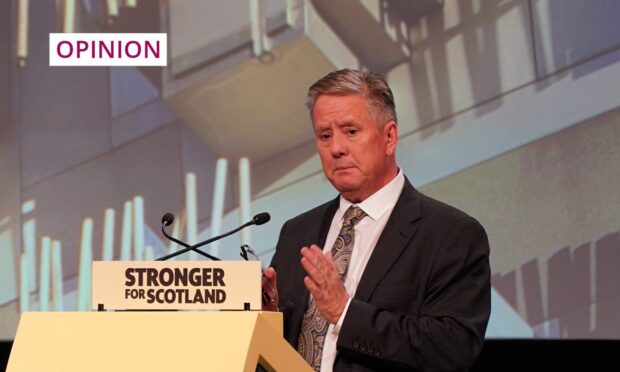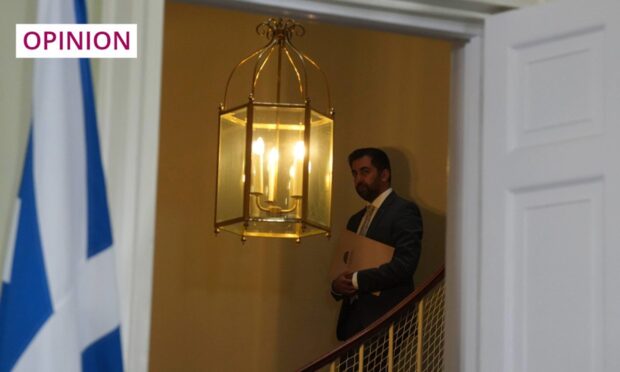The SNP is a peculiarly thin-skinned party. Its politicians rage at the slightest criticism; many of its members interpret disagreement as personal attack.
Publicly questioning a nationalist claim has a similar effect to jabbing a stick in a wasps’ nest.
It was ever thus. Back in the days of his leadership, Alex Salmond would devote more time than was healthy raging at newspaper editors over perceived slights.
A sense of victimhood is a great driver of the SNP project. And so it wasn’t at all surprising when, during his recent speech to his party’s conference in Aberdeen, deputy leader Keith Brown announced the establishment of a rebuttal unit.
No more will the stout and honest men and women of the SNP have to tolerate the lies and smears of their opponents. Thanks to this new service, they will be armed with the truth. Or the SNP’s version of it, anyway.
We’re told that the rebuttal unit is a favoured project of the party’s recently appointed chief executive Murray Foote. If only it had been in operation a few months ago, when Foote was forced to quit as the Nats’ communications director after misleading journalists about SNP membership.
Anyway, let us not dwell on the past and, instead, look forward to a bright new future where the SNP-approved truth may be our guide.
The new unit is supposed to take on damaging opposition narratives and dirty media smears, but I think its staff would do well to start working on combatting some of the nonsense being peddled by the SNP. No opponent could be as audacious as the Nats when it comes to the creation of disinformation.
Pie-in-the-sky policy making
Take the main debate at last week’s conference, for example. Delegates cheered on – and voted to back – the proposal that, should the SNP win a majority of Scottish seats at the next general election, First Minister Humza Yousaf would have a mandate to begin talks with the UK Government about independence.
The SNP’s rebuttal unit – had it existed last weekend – could have informed party members that this was complete nonsense. All those nationalists excited at the prospect of imminent secession talks could have been spared the crushing disappointment when they don’t take place, if only a rebuttal unit had been there to point out that, since constitutional matters remain reserved to Westminster, no general election result – however great – can create a mandate for Yousaf to begin talking to the prime minister of the day about breaking the union.
And, then, there’s that announcement from the first minister of a council tax freeze next year. A properly functioning rebuttal unit could have explained that, no matter what Yousaf claimed about funding this giveaway to the wealthy, it is impossible to know what cuts will have to be made in order to make it a reality.
This policy – which wasn’t even discussed by the cabinet ahead of Yousaf’s speech on Tuesday – was announced before ministers know what sum they will receive in their block grant from the UK Government to cover the forthcoming financial year. An effective rebuttal unit could have explained that this was pie-in-the-sky policy making; an act of panic by a first minister who sees the voters of middle Scotland returning to Labour and feels the need to buy their loyalty.
Rebuttal unit idea suggests desperation
There are other matters the SNP’s rebuttal unit might consider addressing. It could, for example, make clear to party members that the UK Government is not depriving Scotland of millions of pounds in “export duties on Scotch whisky” – a frequently made complaint of independence campaigners – because no such duty exists. And, while those rebutters are rebutting, they could put an end to the conspiracy theory that the UK Government is concealing from Scots the existence of secret oil fields.
Of course, all political parties are entitled to challenge inaccuracies about their claims and positions, but the problem for the SNP is that much of its case for independence is a mixture of half-truths and downright lies.
After almost two decades of political dominance, the party is tired and out of ideas
Whenever anyone dares point out the flaws and inconsistencies in the nationalists’ various – and ever-changing – positions, they should expect not to be given an explanation but to be told they’re talking down Scotland.
The unmistakable stench of decline engulfs Humza Yousaf’s SNP. After almost two decades of political dominance, the party is tired and out of ideas.
The new rebuttal unit is a mark of nationalist desperation. After failing to win the big arguments on the constitutional question, the SNP now wishes to produce its own government-approved “facts”.
Euan McColm is a regular columnist for various Scottish newspapers












Conversation